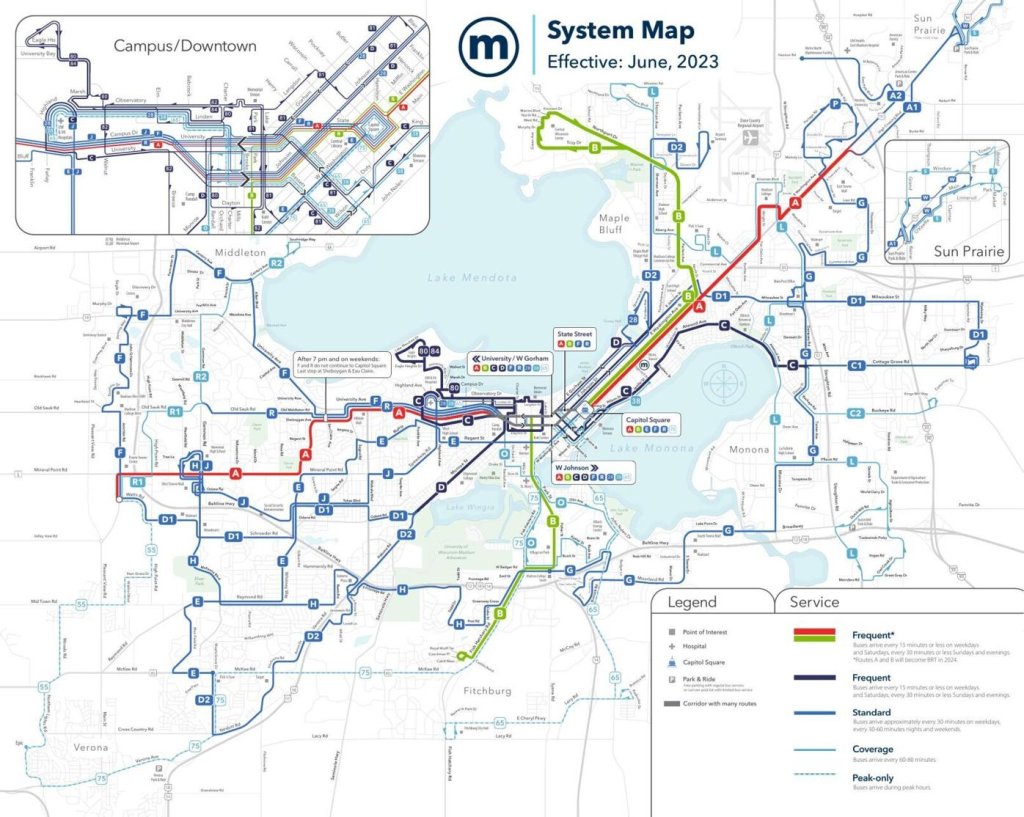Transit riders in Madison, Wisconsin are navigating an entirely new system this week.
Metro Transit in Madison, Wisconsin launched redesigned transit service on June 11—the city’s first transit system redesign in 20 years.
“The city says the changes are meant to shorten commutes and simplify routes,” reports Grace Ulch for WKOW. “The biggest changes riders should expect - many route numbers have changed to letters, new bus stops have been added and Metro's north, east and west transfer points are now closed,” ads Ulch.
A separate article by Allison Garfield for Cap Times, published in May, provides additional details about the system redesign.
“The new bus redesign promises more consistent service with direct routes to outlying areas and the elimination of transfer points and buses from lower State Street,” writes Garfield. “The expansion will include three new routes to Sun Prairie. Bus rapid transit — a completely separate project that is slated to start in the fall of 2024 — will serve as the backbone going east to west and north to south.”
According to both articles, transit users in Madison have expressed concerns about the changes, with officials and some riders disagreeing on the effects of the changes for low-income riders and those with disabilities. According to Garfield, “residents have raised concerns that the system puts a disproportionate burden on low-income riders, people with disabilities and marginalized communities.”
Metro Transit’s General Manager Justin Stuehrenberg claims the opposite is true, however. “On average, Black residents will see a 96% increase in access to jobs within a 45-minute ride, Stuehrenberg said at the Thursday press conference, and for Latinx residents, that number jumps to 120%. Low-income residents will see a 93% increase.”
Newly hired “Ride Guide” staff have been on hand to help the public navigate the redesigned system, according to a city press release.
The Madison City Council first approved the new transit system design in June 2022, but full approval, in December 2022, had to wait until the city completed a Title VI evaluation.

FULL STORY: 'It's a positive change for us': Metro transit system gets its first major redesign in 20 years

‘Forward Together’ Bus System Redesign Rolling Out in Portland
Portland is redesigning its bus system to respond to the changing patterns of the post-pandemic world—with twin goals of increasing ridership and improving equity.

Plan to Potentially Remove Downtown Milwaukee’s Interstate Faces Public Scrutiny
The public is weighing in on a suite of options for repairing, replacing, or removing Interstate 794 in downtown Milwaukee.

Can New York City Go Green Without Renewable Rikers?
New York City’s bold proposal to close the jail on Rikers Island and replace it with green infrastructure is in jeopardy. Will this compromise the city’s ambitious climate goals?

700-Acre Master-Planned Community Planned in Utah
A massive development plan is taking shape for lakefront property in Vineyard, Utah—on the site of a former U.S. Steel Geneva Works facility.

More Cities Ponder the End of Drive-Thrus
Drive-thru fast food restaurants might be a staple of American life, but several U.S. cities are actively considering prohibiting the development of new drive-thrus for the benefit of traffic safety, air quality, and congestion.

Air Pollution World’s Worst Public Health Threat, Report Says
Air pollution is more likely to take years life off the lifespan of the average human than any other external factor, according to a recent report out of the University of Chicago.
Placer County
City of Morganton
HUD's Office of Policy Development and Research
Dongguan Binhaiwan Bay Area Management Committee
City of Waukesha, WI
Los Angeles County Metropolitan Transportation Authority
Indiana Borough
Urban Design for Planners 1: Software Tools
This six-course series explores essential urban design concepts using open source software and equips planners with the tools they need to participate fully in the urban design process.
Planning for Universal Design
Learn the tools for implementing Universal Design in planning regulations.



